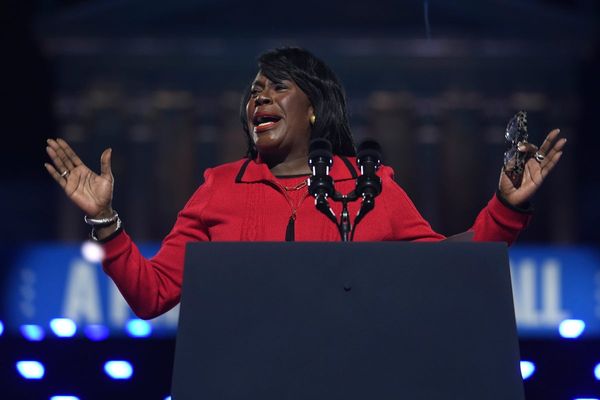NEW YORK — LaChanze is ready for a respite.
As Sept. 11 approaches, the acclaimed actress and singer is facing the painful 20th anniversary of the day she lost her husband in the World Trade Center terrorist attacks. And though the Emmy and Tony Award winner has been the literal voice of 9/11 widows — performing at events and benefits — she says it’s time to give it a rest.
“To be quite honest … I am so ready to not do any more performances on that day. It’s starting to wear on me,” LaChanze told the Daily News. “I need to start to grieve privately.”
This year she’ll be involved in memorial events for Cantor Fitzgerald — the global financial services firm for which her late husband, Calvin Gooding, worked as an international equities trader. The company lost 658 employees that day, about two-thirds of its New York City workforce.
“I think 20 years of being the face and voice of the 9/11 widows and children born after 9/11 is enough. I think this year, that ends for me,” she said. “And we as a family, my daughters and I, have chosen to start grieving privately.”
LaChanze was eight months pregnant with the couple’s second child on Sept. 11, 2001.
“That day is hard to talk about sometimes,” she told The News. “That morning, I was sitting in the chair in my living room. And my phone rang because I had not had the TV on and my sister-in-law called me and told me to turn the TV on.
“And it was right at that time that I saw the towers fall,” LaChanze recalled.
By then, the St. Augustine, Florida, native — born Rhonda LaChanze Sapp — was an established star with her acclaimed Broadway performances in “Dreamgirls,” “Once on This Island,” and “Ragtime.”
Within a year after 9/11 upended the world as she knew it, the widow and mom of two toddlers was ready to get back to work, starring in the concert benefit revival of “Funny Girl.”
“The most motivating factor for me to get myself back on the horse was my daughters,” LaChanze said, noting she also sought psychiatric counseling. “They had lost their father so they couldn’t lose their mother, too.
“So I had to pick myself up, pull myself up by my bootstraps and nurse two babies and make sure that they had what they needed. I needed to be someone who was secure, I needed to make sure that we had everything in order to provide the quality of life that their father would have wanted for them.”
LaChanze credits “The Vagina Monologues” playwright Eve Ensler as an “earth angel” for getting her back on the stage.
“She said, ‘LaChanze, I don’t know how you plan to come back having had this experience but I think your talent is important. I think it will heal you’ … and she was absolutely right,” she said.
Since then, it’s been nonstop for the pint-sized powerhouse, who originated the role of Celie Harris Johnson in the Oprah Winfrey and Scott Sanders-produced Broadway production of “The Color Purple” – winning the Tony Award for best actress in a leading role in 2006.
The University of the Arts alum also lit up the Great White Way in the 2014 musical “If/Then” and “SUMMER: The Donna Summer Musical” in 2018. On television, she’s become a hot commodity, recently appearing in Barry Jenkins’ historical drama series “The Underground Railroad” and NBC’s “The Blacklist.”
Being a doting mom has paid off, too.
Her eldest daughter, Celia Rose Gooding, garnered rave reviews – and a Tony Award nomination – for her Broadway debut in the Alanis Morrisette-inspired “Jagged Little Pill.”
As the painful anniversary approaches, LaChanze can’t help but reflect on where she was then and where she is now.
“Twenty years ago, I couldn’t see past the front door. I couldn’t see anything that was going to happen for me,” she said. “I had no vision for my future because the vision that I had was obliterated. So I had to go deep, deep, deep within and try to trust and trust in faith and trust in the truth, and trust in myself and trust that pain passes and that this will pass and I will be in a better light one day, and that there is the light at the end of the tunnel.
“I just kept saying that to myself when I felt lonely, discouraged, or doubtful. I kept reminding myself that pain is temporary and it passes and moves you beyond to the next space ... and to trust that truth.”
———







